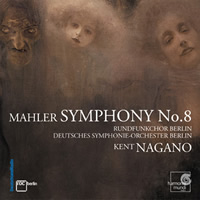| Review by J.B. November 3, 2005 (12 of 12 found this review helpful)
|
|
Vision and Beauty
As I said in my earlier, lengthier review for Amazon, I really think that this is a performance of truthful vision and of often staggering beauty, not least because of the truly magnificent, full and spaceous recording. The most endearing quality, in my very personal opinion, is its relaxedness, which I like very, very much. For me it truly underlines its deeply Romantic source material. But at the same time, this performance is never, ever boring. Well, yes, indeed it does seem slow - sometimes very, very slow - compared to for example Sir Simon Rattle's recording with the City of Birmingham Symphony Orchestra (on EMI). Some commentators - mainly those endeared with Rattle's quickening and freshly alive (more classical?) approach - find this performance lacking in coherence. This is not true: the coherence in Nagano's approach IMHO lies mainly in its quality to let the music breath freely and to let it unfold on itself (for as much such a thing is possible; but then again, this is my rather personal feeling about Nagano's steering). The music is allowed to bloom, helped enormously by the recording.
In the end it's all a matter of tastes, so I would like to say: if you really love Mahler's Eighth Symphony, you should maybe buy BOTH albums and compare ... and cherish.
|
Was this review helpful to you?
yes |
no
|
|
| Review by jlaurson October 10, 2007 (5 of 5 found this review helpful)
|
|
Kent Nagano's latest Mahler recording is now available in the U.S. and should bring the warm rain of Mahler-8 (re-)issues to a halt until Michael Tilson Thomas finishes his cycle with the garishly divine Symphony of a Thousand. Prior to Nagano, Sir Simon Rattle's recording with the City of Birmingham Symphony Orchestra was hailed to the high skies in The Gramophone by Edward Seckerson. I was going to review it, but in stark contrast to Mr. Seckerson, I found it relatively unspecial and, if anything, a bit rushed in the first movement as well as lacking heft and mysticism in the second. In the same review Seckerson also tore apart the Nagano recording in the same over-the-top way with which he praised the Rattle 8th, so that, even before hearing either account, I felt that the review was probably a tad lopsided. I put the Rattle review off until the Nagano recording came out in the U.S. and bought myself two other live recordings of Mahler's 8th to compare for myself, meanwhile. The two were Kubelik's re-released live recording on an Audite SACD and Neeme Järvi's 8th on BIS. The latter is not what might come to mind for great Mahler, but it was highly recommended.
To have thought Mr. Seckerson's review "a tad lopsided" was, as it turned out, a mild understatement. To be sure, the Rattle recording is very fine - and I'd compare it to the famous Solti recording. (That, for most, would be some of the highest praise available. Not so with me, as I don't particularly think that the "epic" Solti recording is "all that," either.) The contributions of vocalists Brewer, Isokoski, Banse, Remmert, (Jane) Henschel, Villars, Wilson-Johnson, and Relyea are certainly more than adequate, but not spine-tinglingly exceptional. The same can be said about Nagano's Greenberg, Dawson, Matthews, Koch, Manistina, Gambill, Rother, and Rootering - the latter a better Pater Profundis than Mr. Releya. But I find Nagano's recording not only not worse (forgive me for the triple negatives) but indeed better than Rattle's. Everyone knows that Gramophone has a pro-British and pro-Rattle bias... but, difference in taste acknowledging, this is silly. Did Nagano shoot the editor's dog?
For once, I could not agree more with David Hurwitz's review on Classics Today, being usually rather sceptical of their reviews. He, too, hears the heft, the mystery in this work that is so utterly lacking from other performances.
"No other performance captures more of the music's mystery and sensuality, revels in the rich details of its orchestration to such a welcome degree, or offers such a clear and characterful distinction between the work's two parts. [...T]he atmosphere is palpable[...]"
That is perhaps one step further than I would go (I still think that the Ozawa recording has the edge on mystery and unearthly shimmer - especially in the Chorus mysticus), but it's very close to how I feel. Nagano does offer that shimmer, that deeper, more mysterious feel, a sound from other spheres - whereas Rattle offers sound from Birmingham Symphony Hall. The prominent organ in Nagano - never overwhelming but far more present than in many other recordings - is a much appreciated touch, too. At 88 minutes (the time it takes him for the second movement is well spent!) it comes on two CDs and is - much to its detriment, I think - not priced at a single disc's cost but at over $30. A major mistake on the part of Harmonia Mundi - given that much of the competition comes at the full price for one disc or less.
Before the positive impression, the first listen on inferior headphones was a shock. The choir, further back than in most recordings, sounded muffled to the point of being inaudible. Set back it is, though fortunately not nearly as badly captured as the ten-dollar headphones suggested. On speakers and Sennheiser headphones alike, it was a very different story.
Speaking of sound: on that plane, the Neeme Järvi recording can compete with any, live or studio. It is clear, brilliant even, yet not too bright, and it lets in plenty of light. At just about 70 minutes it is the fastest performance I know of - and it is proof that speed has little to do with whether a performance is great or not. I don't hesitate including Järvi's 8th among the great performances on record. The singing is very capable, again, and the orchestral contribution outstanding. Crisp it might be, but it transmits a sense of greater meaning, of a truly special occasion. Actually, it was performed for a special occasion, namely in honor of the victims of the M/S Estonia tragedy. Perhaps that explains the flawless playing of the orchestra - more than astounding for a one-off performance.
Speaking of such a performance, Rafael Kubelik's 8th on Audite was also captured on one night (June 24th, 1970, to be precise). There are truly glorious moments in it, especially among the chorus and the singers, which surge without bounds. Martina Arroyo, Erna Spoorenberg, Edith Mathis, Julia Hamari, Norma Procter, Donald Grobe, Dietrich Fischer-Dieskau, and Franz Crass certainly help. Vocally, this may be the most impressive 8th yet - unfortunately repeat listening is marred by some flat woodwinds and off brass. The first time it is hardly noticeable, but knowing the moments of slight failure has me cringe in anticipation. It's not a debilitating flaw, but a flaw nonetheless.
Among these four, although none are 'must-haves', Järvi comes out the unexpected 'victor' - but the more I listen to Nagano, the more I cherish his recording. Especially with Ozawa still out of print, this might be worth thinking about, despite its price.
|
Was this review helpful to you?
yes |
no
|
|

